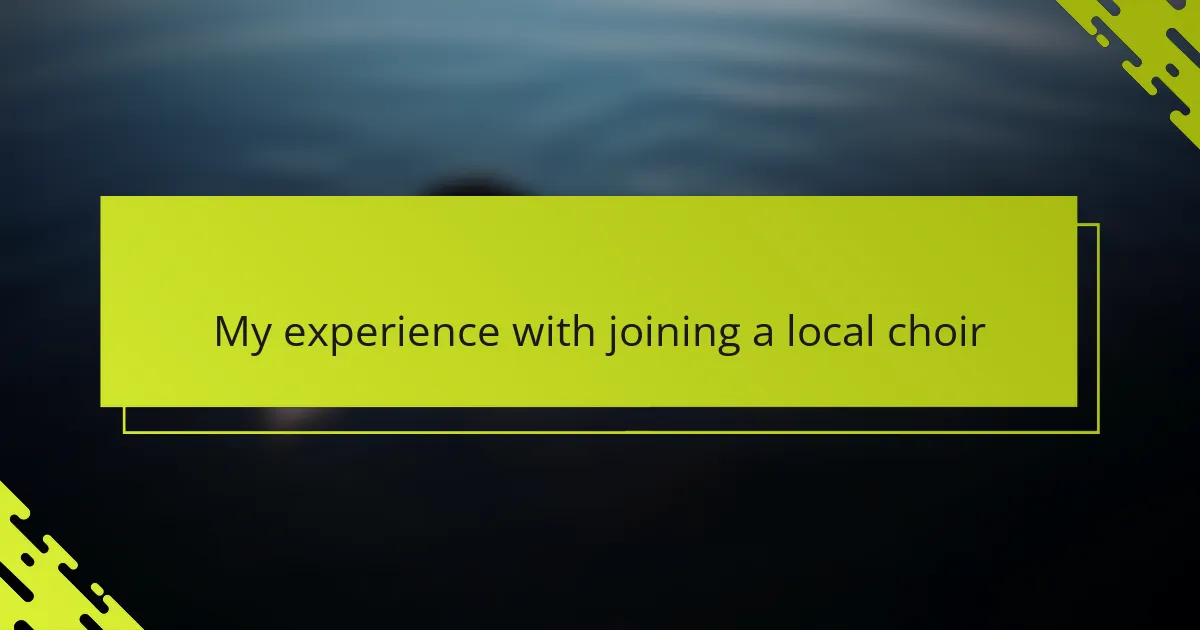Key takeaways
- Queer women culture fosters emotional connections and resilience, providing a sense of safety and empowerment within the community.
- Joining a community choir enhances belonging, confidence, and personal growth while creating a supportive environment for expression.
- Choosing the right choir involves seeking inclusive spaces that value diverse identities and maintain a warm, welcoming atmosphere.
- Consistency in choir participation is key, supported by setting achievable goals and embracing a positive, connection-focused mindset.
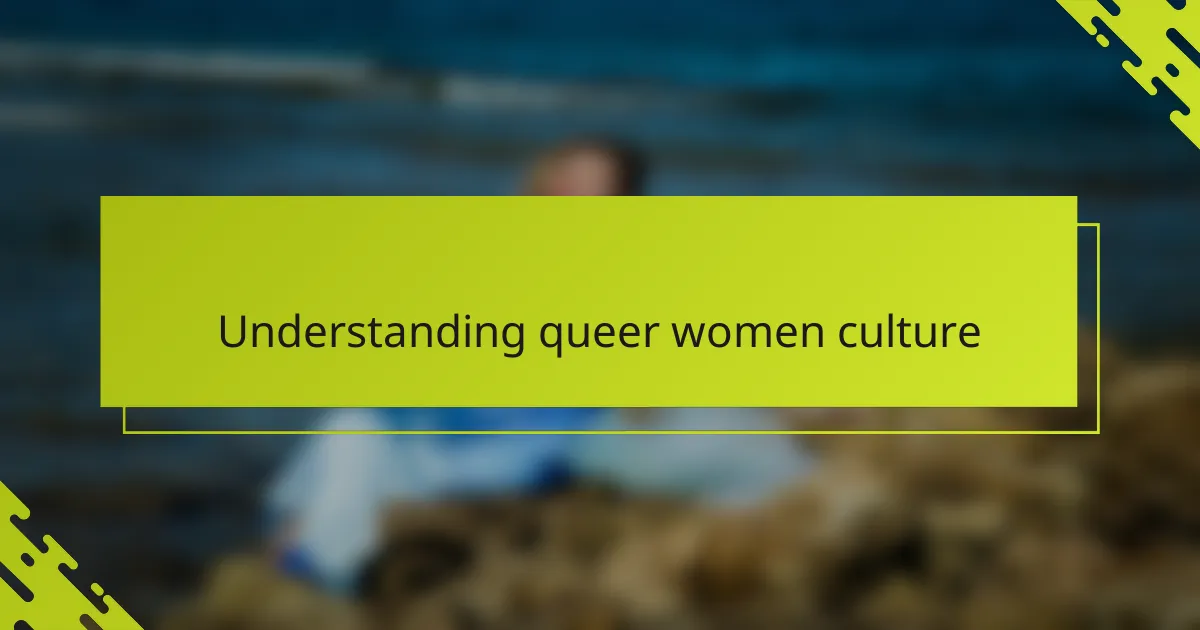
Understanding queer women culture
Queer women culture often feels like a hidden world full of rich stories and shared experiences that defy mainstream expectations. I’ve found that understanding this culture requires more than just knowing labels; it’s about tuning into the emotional connections and the subtle ways identity shapes community. Have you ever noticed how music, art, and gatherings become more than hobbies—they turn into lifelines in this space?
When I first immersed myself in queer women culture, I was struck by how much warmth and authenticity radiated from spaces where people could fully be themselves. It made me question how often society overlooks the nuanced struggles and joys unique to queer women. Isn’t it powerful how belonging to such a culture can foster a profound sense of safety and empowerment?
What truly stands out to me is the resilience woven into queer women culture; it’s not just about surviving but thriving with pride and creativity. This resilience comes through in everyday interactions and in the support networks that emerge when you least expect them. Have you felt that surge of strength when connecting with others who share your experience? It’s transformative.
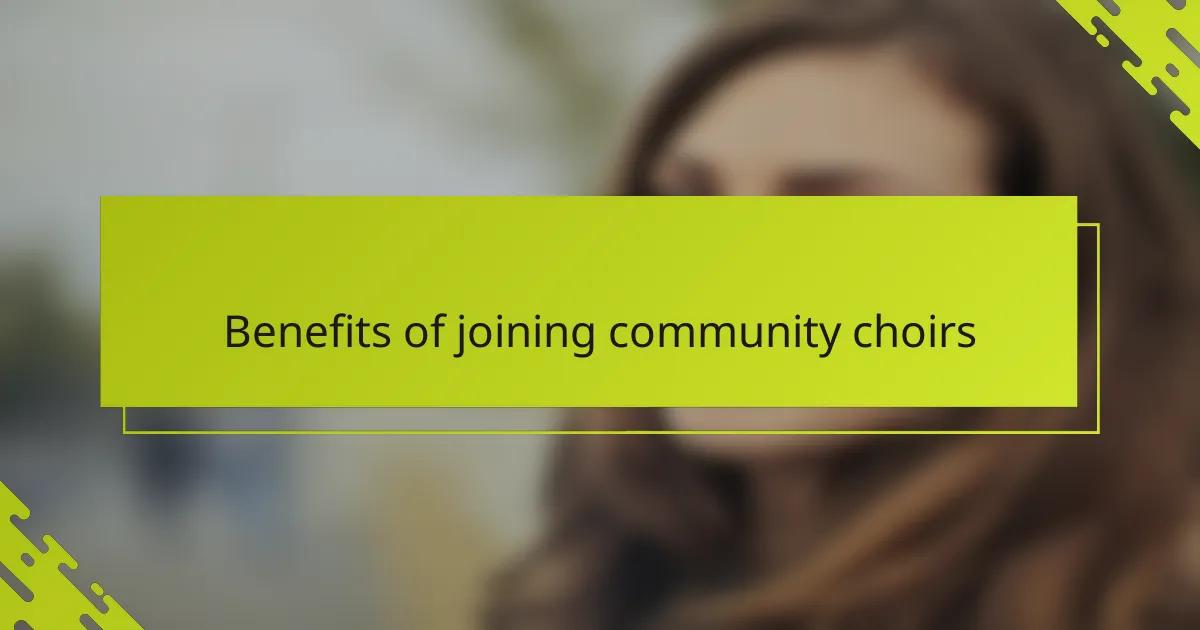
Benefits of joining community choirs
Joining a community choir, especially as someone navigating queer women culture, can be unexpectedly healing. I remember the first rehearsal feeling a mix of nerves and excitement, but soon realizing that singing together created an unspoken bond. Have you ever noticed how music can break down walls faster than words ever could?
Another benefit I found was the sense of belonging it sparked. In the choir, I wasn’t just one voice among many; I was part of a collective story that embraced diversity and individuality. It made me feel seen and heard in ways that went beyond everyday interactions—like my identity mattered fully in that shared space.
And here’s something I didn’t expect: joining a choir also boosted my confidence. Standing up to sing in front of others, matching pitch and rhythm, taught me to trust myself more. Can you imagine how empowering it feels when your personal growth harmonizes with a group’s energy? That’s the magic of community choirs.
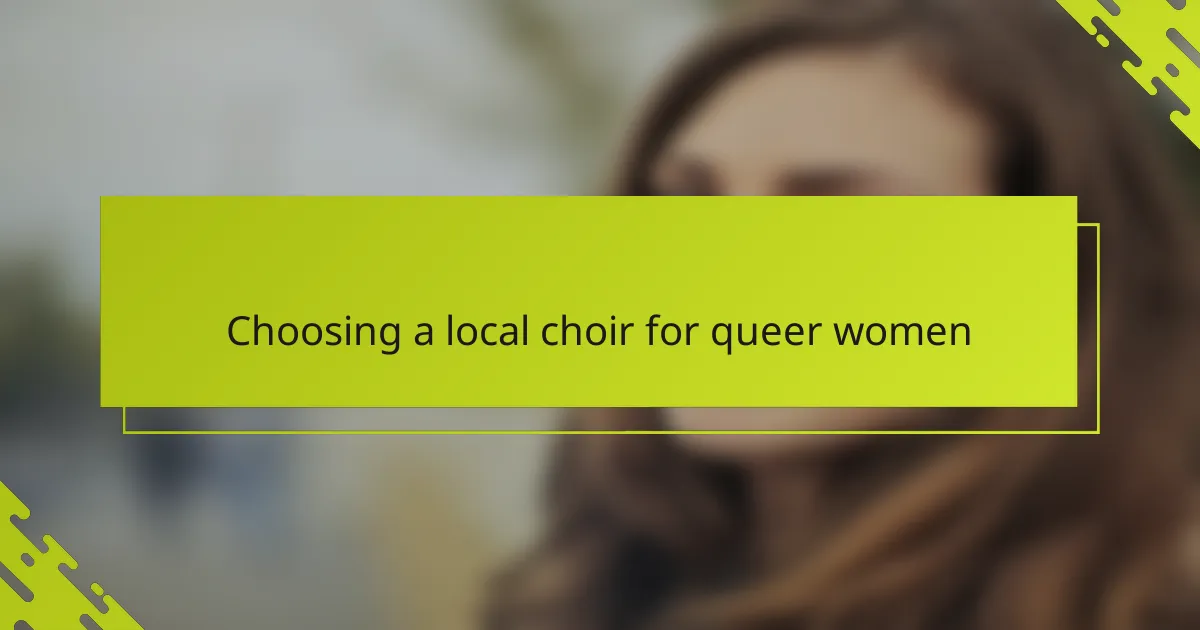
Choosing a local choir for queer women
Finding the right local choir for queer women is about more than just singing—it’s about discovering a space where your whole self feels welcomed. When I was searching, I looked for groups that explicitly valued inclusivity and celebrated diverse identities, because that sense of belonging matters deeply. Have you found that communities listing clear affirmations of queer safety often create the most genuine connections?
What stood out to me was the importance of atmosphere. Some choirs felt more like families, where stories and laughter flowed as freely as the music. I remember one rehearsal where someone shared a personal coming-out story mid-practice—it struck me how open and supportive the environment was. Don’t you think the tone of a group sets the stage for how comfortable you’ll feel sharing your own journey?
I also considered the practical side: rehearsal schedules, musical genres, and leadership. Choosing a choir that fit my lifestyle and musical tastes kept me engaged and excited to show up week after week. Reflecting on it, have you noticed how balancing commitment with joy makes any community experience truly sustainable?
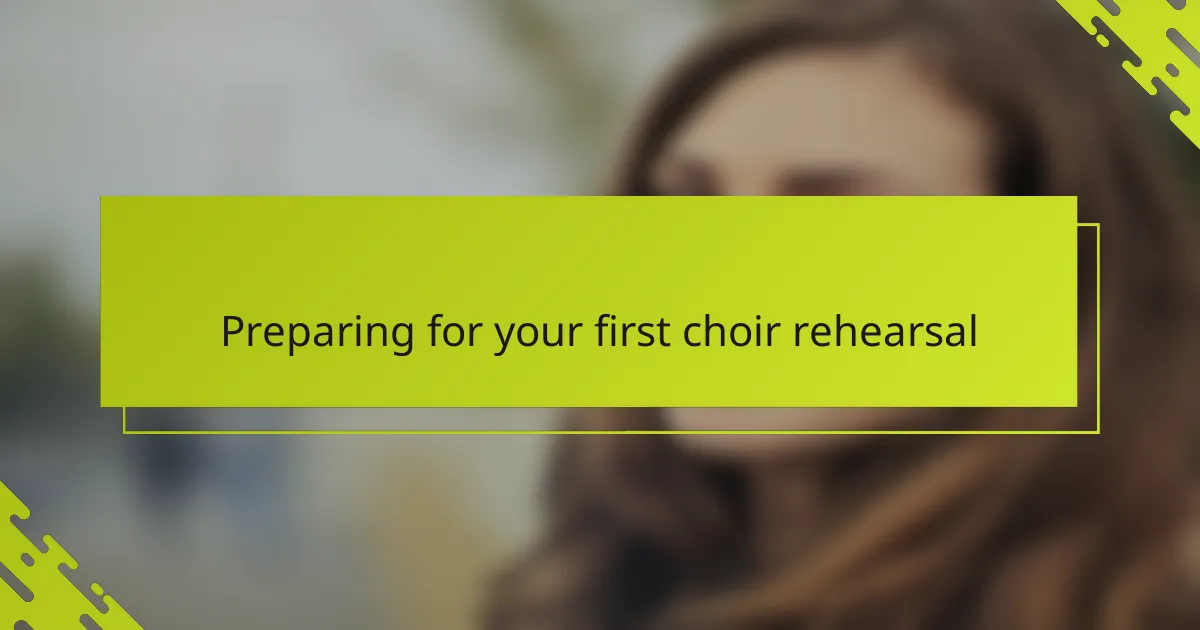
Preparing for your first choir rehearsal
Walking into my first choir rehearsal, I made sure to prepare by listening to some of the songs beforehand. It helped me feel less like a fish out of water and more like I had something to contribute. Have you ever tried learning melodies ahead of time? It really takes the edge off those first jitters.
I also thought about what to bring—water, a notebook for lyrics and notes, and, most importantly, an open heart. In my experience, showing up mentally ready to connect made all the difference between just singing and truly belonging. What small habits do you think set the tone for meaningful participation?
One thing I didn’t expect was how much it helped to mentally prepare myself for the social aspect too. I reminded myself that everyone else was probably a little nervous, and that sense of shared vulnerability made breaking the ice easier. Have you ever noticed how a little empathy can dissolve tension before it even starts?
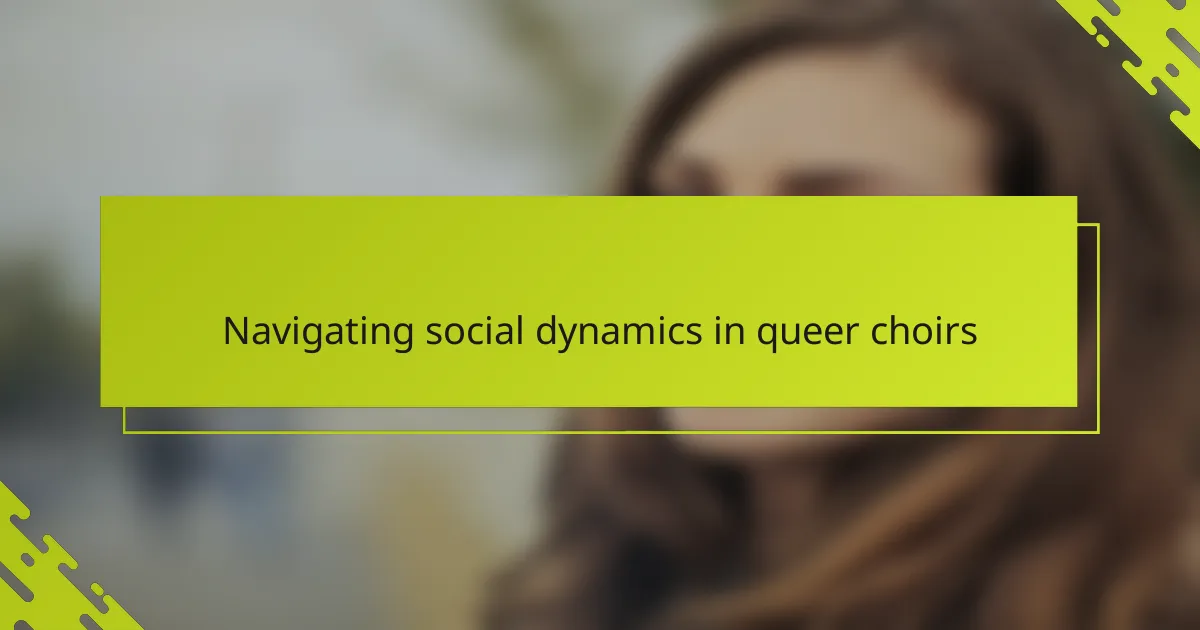
Navigating social dynamics in queer choirs
Social dynamics in queer choirs are distinctively tender yet complex. When I first joined, I noticed conversations often danced around shared experiences and subtle unspoken cues, which made me wonder—how much do we communicate without words in spaces where identity feels both safe and fluid?
Navigating friendships within the choir required a balance of openness and respect. I found myself learning when to share parts of my story and when to simply listen, understanding that everyone’s journey is layered and personal. Have you ever felt that beautiful tension between wanting to connect deeply and honoring others’ boundaries?
One moment that stuck with me was during a break when someone gently corrected a mispronounced name, and the group’s response was immediate and warm. It reminded me how attentiveness to small details builds trust and belonging far beyond the music itself. Doesn’t it feel incredible when a simple act like that signals, “You are truly seen here”?
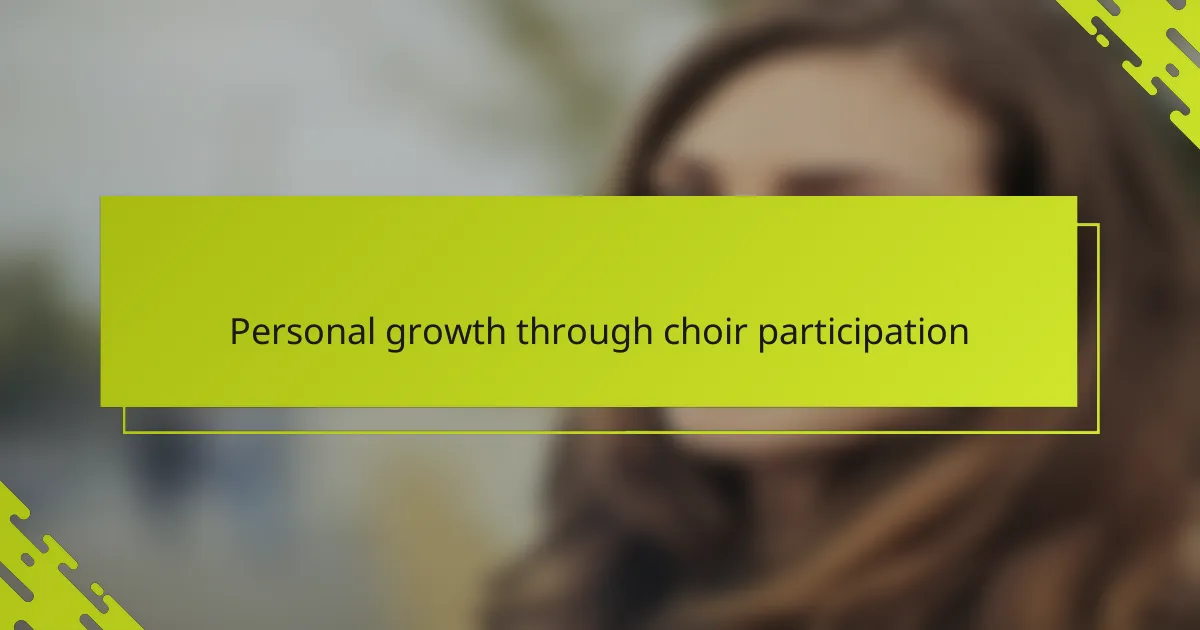
Personal growth through choir participation
Joining the choir became a mirror for my own growth. I realized that learning to blend my voice with others wasn’t just about harmony—it taught me patience and the art of listening deeply. Have you ever noticed how singing in unison can soften your inner critic and open space for self-acceptance?
There’s something empowering about stepping outside my comfort zone each week, facing the vulnerability of exposing my voice and emotions. Over time, I found that this regular practice nurtured my confidence not just in singing, but in expressing myself authentically in everyday life. How often do we give ourselves permission to take up space and be heard?
Most surprisingly, the choir helped me cultivate resilience. When performances felt daunting or when I struggled with unfamiliar parts, the collective encouragement reminded me that growth is a process—not perfection. Doesn’t it feel transformative when support and challenge come hand in hand?
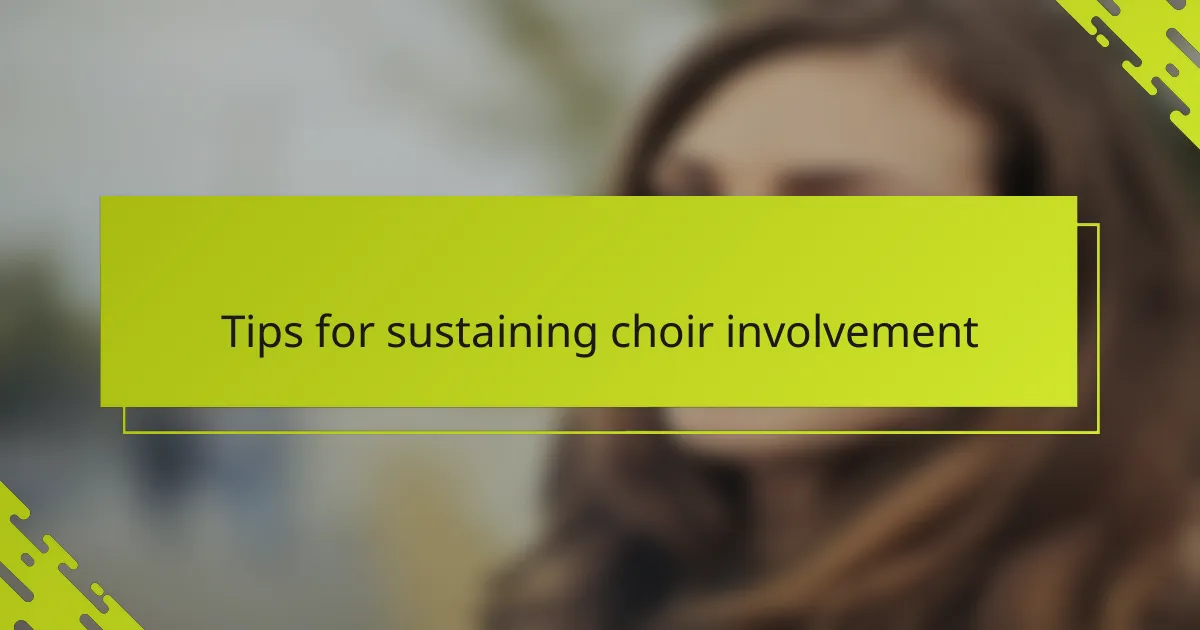
Tips for sustaining choir involvement
Staying connected to a choir over time means embracing routine without losing joy. I found that marking rehearsals on my calendar and treating them like important appointments helped me show up consistently. Have you noticed how creating space for something you love can become a grounding force amid life’s chaos?
It also helped me to keep setting small, achievable goals—whether it was mastering a difficult harmony or simply making one new friend each season. These little wins kept me motivated and made the experience feel fresh. Have you ever felt that sense of momentum when your passion meets progress?
Sometimes, I reminded myself to be gentle with the process, especially on days when life pulled me away or my voice didn’t feel strong. Remembering that choir involvement is about connection, not perfection, made the difference. Doesn’t that perspective ease the pressure and invite a more joyful participation?
